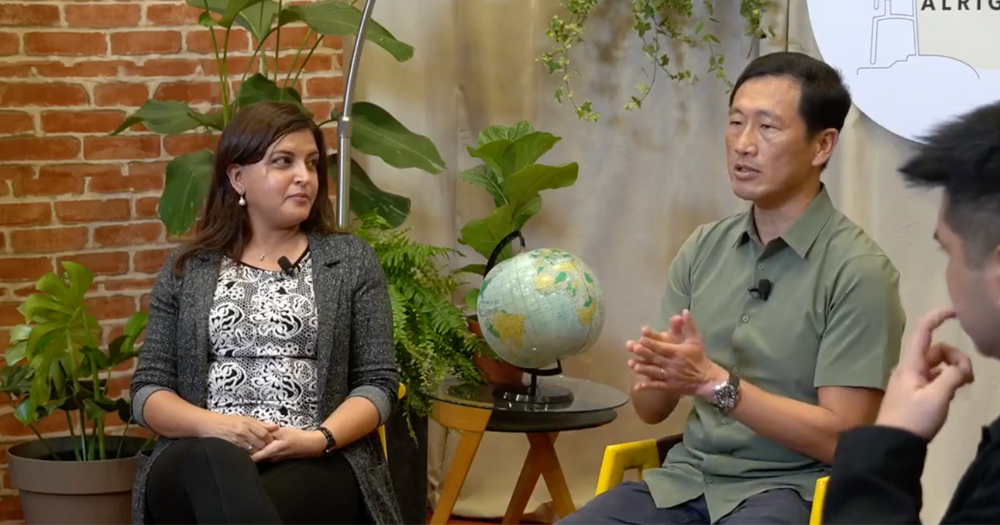Follow us on Telegram for the latest updates: https://t.me/mothershipsg
Health Minister Ong Ye Kung said the mental health challenges that young people of this generation face constitute a "profound issue".
It is, therefore, important to identify what changes have occurred in this generation that have led to this trend.
Ong also said an Interagency Taskforce on Mental Health and Well-being was set up in August to look into mental health issues, and it is working closely with young people, as well as the education ministry on this front, Ong said.
The taskforce is chaired by Senior Minister of State for Health Janil Puthucheary.
A profound issue that preoccupies MOH
Ong was speaking at a panel discussion on Oct. 16, organised by community initiative, "Project: It'll be Alright".
The project is mentored by Minister of State for Education and Social and Family Development, Sun Xueling, who was also the moderator of the discussion.
Ong said based on data available around the world, there is a higher incidence of mental health issues among young people of this generation.But more awareness on mental health issues is not just about young people talking more about it or a matter of better diagnosis.
Ong said:
"I do not think [it] is just a matter of young people talking more about it, and therefore [it creates] general higher awareness. I don't think it's a matter of better diagnosis. I do think looking at WHO (World Health Organisation) data and other data around the world, we are seeing higher incidence of mental health issues amongst young people. So I think that it's important for us to recognise something has changed in the last 10 to 20 years. And to tackle this problem, to solve the individual personal mental health issues of young people, we have to recognise what these shifts that [have] happened [in] this generation. And I think that is what preoccupies MOH as well."
Ong added that the interagency taskforce is also moving in the direction of reducing stigma on mental health issues.
"In terms of reducing stigma, what the government says, I must admit, counts. And the government can make a statement to say, 'We see that this generation has additional challenges, leading to mental health issues, and we should not stigmatise it. We should be open, share, and that is part and parcel of preventive and community care.' I think the interagency task force is moving in that direction."
Equip young people with necessary skills
Ong also shared during the panel discussion his views on how to strengthen young people's mental resilience
He said it is difficult to teach or tell someone how to be resilient but what needs to be done is to teach them the necessary skills to survive.
"From primary school we throw them into the jungle of Internet, and they're supposed to survive, [that] is too much to ask, for a child," Ong said.
Unlike previous generations, this generation of young people spend most of their time in the virtual world where they compare themselves with others, or be subjected to bullying, sexual harassment and violence, he highlighted.
Therefore, digital literacy has to be taught from young.
Sun added that there is a greater emphasis on cyber wellness issues in the revamped Character and Citizenship Education (CCE) curriculum.
Teachers go through scenario-based situations with students during CCE class and such conversations can help students recognise the online dangers and navigate the online space better, Sun added.
Reach out to new colleagues, cannot leave them on Zoom
The discussion also touched on how Covid-19 disruptions have taken a toll on young working adults' mental health.
Some may face problems transiting from school to workplace while others may face issues transiting into a new workplace, Sun pointed out.
In response, Ong said social activities with colleagues are important to strike a mental balance at work and to help inculcate a sense of belonging in the organisation.
This cannot be achieved through virtual meetings, Ong added, and so "we have to revert back to normalcy".
"Otherwise, many people may not suffer from Covid, but will suffer in many other ways," Ong said.
In the meanwhile, Ong advised supervisors and bosses at workplaces to actively reach out to young people who have just joined their organisations.
Ong said:
"You cannot leave them on Zoom, you know. You got to pay some attention, call them... You are allowed to meet two persons now, meet up sometimes one-to-one, talk about their work. They do need mentorship, guidance and coaching. And for the young people, do not feel shy, just as all of us are saying, do not feel shy, if you're stressed. Do not feel shy, if you start to feel a bit depressed, reach out to people who can help you and you do need that face to face interaction."
Follow and listen to our podcast here
Top image via screenshot of It'll be Alright SG/Facebook
If you like what you read, follow us on Facebook, Instagram, Twitter and Telegram to get the latest updates.
